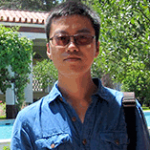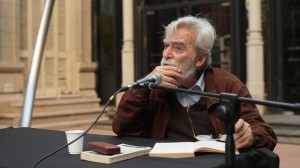Two poems by Zhu Zhu, translated by Dong Li.
月亮上的新泽西
by Zhu Zhu— 致L.Z.
这是你的树,河流,草地,
你的大房子,你的美国,
这是你在另一颗星球上的生活,
你放慢车速引我穿行在山麓间,
就像在宽银幕上播放私生活的记录片。
大客厅的墙头挂着印象派的复制品,
地板上堆满你女儿的玩具,
白天,当丈夫去了曼哈顿,
孩子去了幼儿园,街区里静得
只剩吸尘器和割草机的交谈,
你就在跑步机上,像那列玩具火车
在它的环形跑道上,一圈又一圈地旋转……
这里我惊讶于某种异化,
并非因为你已经改换国籍
或者成为了别人的妻子,我
惊讶于你的流浪这么快就到达了终点——
我们年轻时梦想的乐土
已经被简化成一座舒适的囚笼,
并且,在厚厚的丝绒软垫上,
只要谈论起中国,你的嘴角就泛起冷嘲的微笑。
我还悲哀于你错失了一场史诗般的变迁,
一个在现实中被颠倒的时间神话:
你在这里的每一年,
是我们在故乡度过的每一天。
傍晚,我回到皇后区的小旅馆里,
将外套搭在椅背上,眼前飘过
当年那个狂野的女孩,爱
自由胜过梅里美笔下的卡门,走在
游行的队列中,就像德拉克洛瓦画中的女神。
……记忆徒留风筝的线轴,
我知道我已经无法带你回家了,
甚至连祝福也显得多余。
无人赋予使命,深夜
我梦见自己一脚跨过太平洋,
重回烈火浓烟的疆场,
填放着弓弩,继续射杀那些毒太阳。
new jersey on the moon
by Zhu Zhu— to l.z.
this is your tree, river, lawn,
your big house, your america.
this is your life on another planet,
you slow down the car to lead me through foothills,
like a documentary of private life on the wide screen.
reprints by impressionists hang on the living room wall,
your daughter’s toys piled high on the floor,
daytime when your husband goes to manhattan,
and your child to kindergarten, the streets fall silent
except for conversation between vacuum and lawn mower,
on the treadmill, like a toy train
on its oval track you go around and around…
here i am surprised by a sense of strangeness,
not that you have already changed your nationality
or become someone’s wife, i am
surprised that your wanderings have so soon come to the end—
the dreamed-of happy land of our youth
already abbreviated into a comfort cage,
and on the thick velvet couch,
once we speak of china, your mouth curls in a smirk.
i am saddened that you have missed an epic change in time,
a myth of time upended amid reality;
every one of your years here,
is a day that we have spent back home.
twilight, i return to the hotel in queens,
put my coat on the back of the chair, before my eyes
that wild girl floats by, loving
freedom more than carmen depicted by mérimée, walking
among marchers in a parade, like a goddness painted by delacroix.
…memory retains nothing but the kite’s spool,
i know i can no longer take you home,
even blessings seem unnecessary.
no one to entrust a mission, deep in the night
i dream of myself one step over the pacific,
back to fire-bright smoke-thick battlefields,
loading crossbows and shooting down those toxic suns.
translated from Chinese by Dong Li路过
by Zhu Zhu昨夜并未喝酒,醒来
却带着宿醉——在旅馆
罩上蒸汽的镜子前,我怔忡地
倾听城区的车流。这里
我认识一位朋友,抛开了天赋
忙于捕捉廉价的赞美;一个
古典文学教授,爱自己的文字胜过
爱他人;一个音乐学院毕业的女孩,
丢失了爱情却爱上这个地方,
她有三份工作和少得可怜的睡眠,
——比这些更悲伤,是
几代人的激情转眼已耗尽,每个人
匆匆地走着,诅咒着,抱怨着,
冥冥中像无数把生锈的剑粘在一起——
这个平常的春日,他们当中有谁
能察觉我带有苛责的思念?
就让他们保持过去的时光中最好的的样子吧。
就让我路过而不拜访,继续孤单的旅程——
嗓子干渴,舌头被烙铁灼伤,
想说的话盘旋在昏沉的大脑里,如此难产,
为此需要年复一年地默祷,
反复地拥抱阵雨,风景,岔路。
我脆弱如树影,在路面的水洼里
感受着被车轮碾过的疼痛;
我冷,因为对面没有光,
人们相见时,都是捻暗的灯笼。
passing by
by Zhu Zhunot a drop last night, yet i woke
feeling hung over—at a hotel
before a steamed mirror, in shock, i
listened to the city’s river of traffic. here
i know a friend, who brushed his gifts aside
and scurried to capture cheap praises; a
classic literature professor, who loved his words more
than he did others; a girl, a music school grad
lost a love yet fell in love with this place,
had three jobs and precious little sleep,
—sadder than this was the passion drained away
from several generations in a flash, all of them
rushing ahead, cursing, complaining,
like countless rusty swords impelled to stick together—
a usual spring day, who amongst them
could discern my exacting wishes?
let them keep the best face on the past.
let me pass by without a visit and continue my journey—
throat dry, tongue scorched by soldering iron,
words swirl in dazed mind, so slow to come,
thus the need to pray year after year,
embrace rain showers repeatedly, landscapes and forked roads.
frail like tree shadow, in the puddles of the road
i feel the pain of being rolled over by wheels;
i am cold, because there is no light on the other side,
when people meet, lanterns are turned down low.
translated from Chinese by Dong Li


 Two poems by Juan Carlos Mestre translated by Patrick Marion Bradley.
Two poems by Juan Carlos Mestre translated by Patrick Marion Bradley. 